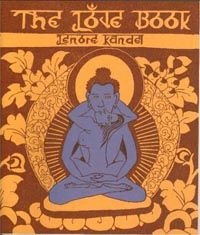Lenore Kandel (1932-2009)
2. 11. 2009 | Rubriky: Articles,Lives
“When a society is afraid of its poets, it is afraid of itself. A society afraid of itself stands as another definition of hell.” – Lenore Kandel
 [by Ken Hunt, London] The Beat poet and counter-culture activist Lenore Kandel died on 18 October 2009 aged 77 in her adopted home town of San Francisco. There is a lazy default setting to think of the Beat movement as being primarily a male preserve. Yet women were also actively involved not only as muses but also as writers and activists. Kandel was doubly important in that regard because she was part of California’s Beat movement and its hippie movement.
[by Ken Hunt, London] The Beat poet and counter-culture activist Lenore Kandel died on 18 October 2009 aged 77 in her adopted home town of San Francisco. There is a lazy default setting to think of the Beat movement as being primarily a male preserve. Yet women were also actively involved not only as muses but also as writers and activists. Kandel was doubly important in that regard because she was part of California’s Beat movement and its hippie movement.
She was born in New York City on 14 January 1932; she was taken as a babe-in-arms to California where her writer father busied himself writing fiction and Hollywood screenplays. (Amongst others, Aben Kandel was responsible for the 1957 horror I Was A Teen-Age Werewolf – and therefore was possibly indirectly responsible for The Cramps’ I Was A Teen-Age Werewolf as well.) With a handful of slim books of poetry to her credit, Lenore Kandel went north to San Francisco to visit in 1960 and never quite left – although she did waver between San Francisco and Hawaii at certain points.
In San Francisco she fell in with the poetry scene centred in the North Beach district of the city, meeting the likes of Gary Snyder and Kerouac – who put her into his 1962 novel Big Sur under the alias Romana Swartz. There he described her as “a big Rumanian monster beauty of some kind I mean with big purple eyes and very tall and big (but Mae West big)” before going on, clearly captivated by her intelligence and urbanity, to describe her non-physical attributes.
Her physical attributes and mind brought her lovers and into contact with the poetry demi-monde of San Francisco. Her unique selling point was the mysticism and unabashed erotic nature of her poetry. Reading her poetry now, its likelihood to shock is plain. Or arouse. Yet presciently she also wove in elements of South Asian and Asian mysticism and belief systems.
When her limited-edition, four-poem, eight-page chapbook The Love Book (1966) appeared it became a target for censorship. 1966 was the year that Ronald Reagan was tilting for power as Governor of California and was righteously calling down showers of brimstone on student protesters, welfare wastrels, society’s undesirables and suchlike ‘politically’ soft targets. He worked the stage so well or well enough for him to be elected in 1967. This, after all, was the actor who recorded Ronald Reagan Speaks Out Against SOCIALIZED MEDICINE (1961) – the capitals are from the record’s artwork, not this author’s – for a handful of shekels from the right side of medicine.
The Love Book‘s poems celebrated sexuality and eroticism – more importantly in some cases the divine nature of sexuality – and did not stint on using words of no ambiguity whatsoever. That explicit language was its downfall, for in the process her poetic candour was treated as pornographic. It occasioned what became the then-longest running obscenity trial in San Franciscan history. When found guilty it went to appeal. The California Supreme Court upheld the obscenity ruling in 1967. The book effectively disappeared. In fact it had considerable merit and was before its time in addressing the erotic through alternative and contemporary prisms.
Between writing poetry that was about to be banned and poetry readings, Kandel was also an early member of San Francisco’s Diggers – a loose-knit organisation that was there in San Francisco to dispense free food, poetry, non-party community politics and anarchy to the district’s drop-out influx when the Summer of Love occurred in 1967. The Diggers also engaged with the up-and-coming bands like Jefferson Airplane and the Grateful Dead to play for free. Kandel continued writing, having Word Alchemy published in 1967.
Quite how her poetry would have changed or was changed is speculative, for in 1970 she was involved in a motorcycle accident that changed her life. The crash left her with a crushed spine and even though she continued writing she never had another book published. She did, however, continue to give poetry readings – at least until 2007 when she read at the Jewish Cultural Center in San Francisco – and through Sore Dove Press published a signed broadside poem as part of the Meat/Beat Broadside project. The lack of further books of poetry is a shortcoming apparently to be remedied, for a collected works-like volume containing The Love Book, Word Alchemy and hitherto unpublished poetry has long been under way.